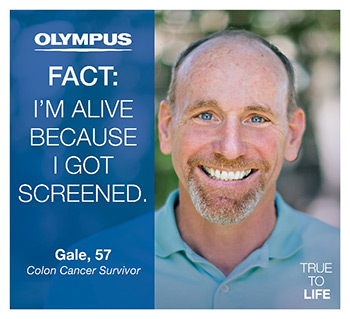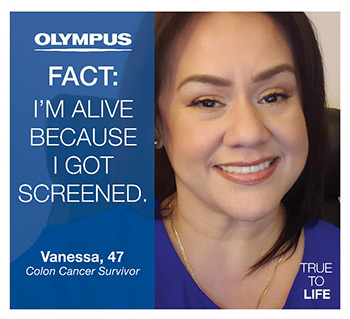Olympus Launches Awareness Initiatives in Support of Colorectal Cancer Awareness Month
Olympus commits to the prevention and detection of colon cancer through charitable support and awareness events.




Center Valley, PA (March 4, 2021) – Olympus announced today its 2021 support of major national colorectal cancer (CRC) organizations and initiatives to increase screening and awareness, as part of National Colorectal Cancer Awareness Month, which is observed annually to educate the public on the importance of colorectal cancer prevention. These initiatives are more important than ever, with a 84.5% decline of colorectal cancer screening rates since the start of pandemic. This decline puts thousands at risk for delayed or missed diagnoses1. Moreover, in a 2020 survey, Olympus found that more than 50% of respondents lacked awareness of colon cancer symptoms such as the size, shape and texture of their bowel movements.
Top initiatives Olympus is supporting to promote colorectal cancer awareness include:
Colorectal Cancer Screening:
- Remote Area Medical (RAM): Funding 400 FIT screening kits for RAM mobile health clinics and telehealth program.2
- Colorectal Cancer Alliance (CCA): Sponsoring CCA’s National Awareness Campaign in response to the dramatic decrease in screening rates due to COVID-19. 3
- Bradbury Sullivan LGBT Community Center: Funding a campaign to promote awareness and bridge healthcare disparity gaps within the LGBTQ community. 4
Awareness Building Opportunities:
- Colon Cancer Coalition: Sponsoring the “Tour de Tush” virtual cyclist event in May and “Get Your Rear in Gear” run/walk events.
- General Education: Continuing patient education outreach via updates to colonoscopytoday.com and truetolife.com/blog.
- Inspiring Stories Webinar: Sponsoring the Colon Cancer Coalition’s Your Story Can Save a Life: How to Craft Your Story to Inspire Colorectal Cancer Screening webinar on March 11th at 1:00 PM (EST). Register for the webinar, here.
- Survivor Video Testimonials: Gathering 100 colorectal cancer survivor video stories to put faces to the milestone number that early detection and medical advancement have made possible: more than 1 million people have survived colon cancer.
- AdvaMed Health Equity Pledge: Pledging to ensure that Olympus is doing its part to mitigate the adverse impacts of health disparities among people and communities of color through the AdvaMed Health Equity Initiative pledge.
“This past year, we saw a number of unexpected challenges,” said Julien Sauvagnargues, President of Olympus Corporation of the Americas. “Spreading awareness on the rise of colorectal cancer in the United States is a priority for Olympus this year more than ever before. Through our valued partnerships with Colon Cancer Coalition, Colorectal Cancer Alliance, Remote Area Medical and Bradbury Sullivan LGBT Community Center, we aim to get screening rates back on the right track and increase awareness on the importance of early detection.”
In 2016, the U.S. Preventive Services Task Force (USPSTF) recommended screening for colorectal cancer with one of several available tests, including colonoscopy, beginning at age 50 and continuing until age 75. Given the rise in early onset CRC cases, the USPSTF has drafted a recommendation to lower the recommended screening age for people at average risk of colon cancer to 45 in alignment with the American Cancer Society.5,6
Considered the “gold standard for detection of colon cancer,” colonoscopy gives physicians the opportunity to detect and remove precancerous polyps during screening, potentially before they become malignant. Colorectal cancer is the second leading cancer killer among men and women combined and is largely preventable through screening and early detection.8
One measure of effective colorectal cancer screening is the rate of detection for cancerous polyps in the colon, known as the adenoma detection rate (ADR). With assistive technologies, physicians can improve their ADR and reduce colorectal cancer incidences. One such assistive technology is the Olympus ENDOCUFF VISION® diagnostic device, which is attached to the distal tip of the colonoscope and increases visibility of the colon surface by flattening mucosal folds. Research has shown that use of the ENDOCUFF VISION improves the effectiveness and efficiency of colonoscopies by increasing adenoma detection rates by up to 11% compared to a standard colonoscopy.9,10 For every 1% increase in ADR, there is a 3% reduction in the risk of interval colorectal cancer and a 5% reduction in the risk of fatal colorectal cancer11. Higher detection rates and more accurate diagnosis could, therefore, help reduce the number of deaths from preventable digestive cancers, such as CRC.
Olympus joins the health care community in increasing public awareness of this deadly disease in order to improve patient care with the goal of saving lives. To learn more about colorectal cancer visit, https://www.colonoscopytoday.com/.
# # #
About Olympus
Olympus is passionate about the solutions it creates for the medical, life sciences, and industrial equipment industries. For more than 100 years, Olympus has focused on making people’s lives healthier, safer and more fulfilling by helping detect, prevent, and treat disease, furthering scientific research, ensuring public safety, and capturing images of the world. Olympus Corporation is headquartered in Tokyo, Japan, with more than 35,000 employees worldwide in nearly 40 countries
Olympus Corporation of the Americas, a wholly owned subsidiary of Olympus Corporation, is headquartered in Center Valley, Pennsylvania, USA, and employs more than 5,500 employees throughout locations in North and South America.
- Quick Safety Issue 58. The Joint Commission. https://www.jointcommission.org/resources/news-and-multimedia/newsletters/newsletters/quick-safety/quick-safety-issue-58/.
- https://www.ramusa.org/
- https://www.ccalliance.org/
- https://www.bradburysullivancenter.org/
- Howard J. US task force proposes starting colorectal cancer screening at age 45. CNN. https://www.cnn.com/2020/10/27/health/colorectal-cancer-screening-draft-recommendations-uspstf-wellness/index.html. Published October 27, 2020.
- American Cancer Society. American Cancer Society Updates Colorectal Cancer Screening Guidelines. https://www.cancer.org/latest-news/american-cancer-society-updates-colorectal-cancer-screening-guideline.html. Accessed February 20, 2020.
- Colon Cancer Coalition. Colon Cancer Screening Options. https://coloncancercoalition.org/get-educated/get-screened/colon-cancer-screening-options/. Accessed February 19, 2020.
- American Cancer Society. Key statistics for colorectal cancer. https://www.cancer.org/cancer/colon-rectal-cancer/about/key-statistics.html. Accessed February 18, 2020.
- Ngu WS, Bevan R, Tsiamoulos ZP, et al. Improved adenoma detection with Endocuff Vision: the ADENOMA randomised controlled trial. Gut 2019;68:280-288.
- Williet, N., Tournier, Q., et al. Effect of Endocuff-assisted colonoscopy on adenoma detection rate: meta-analysis of randomized controlled trials. Endoscopy. 2018;50(9), 846-860. Doi: 10.1055/a-0577-3500.
- Corley DA, Jensen CD, Marks AR, et al. Adenoma Detection Rate and Risk of Colorectal Cancer and Death. N Engl J Med. 2014; 370:1298–1306. Doi: 10.1056/NEJMoa1309086.


































